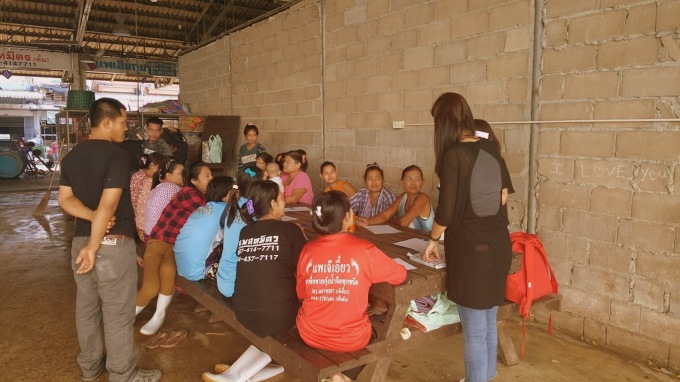December 2, 2016
Getting comfortable with ambiguity is what I am learning from Thailand. Yesterday no one wanted to say that the crown prince is taking oath. Today, the streets are lined with people congratulating each other on the new king. Either they just didn’t want to share with an outsider or the Thai people are really comfortable not knowing – until they know and happily accept what they are told.
Today was workshop day in Samut Sakhon, also known as Mahachai, around 48 kilometres outside of Bangkok. Rightly so, we planned to leave the hotel at 8am for a 1pm workshop. For a town located only an hour or so away, it is remarkable that we only made it to the office at 12:30pm. The contact person in Mahachai, sweet as she was, was terrible at giving directions. “You’ll find the van at Victory Monument,” was all she said and we found out just how vague her directions were when we saw the number of buses and lack of English signs at Victory Monument. A bus lady took pity on us and pointed out a local bus which was slowly inching away from the kerb. We hopped on confident that we were on our way to Samut Sakhon. Only 40 baht for both Yeseul and I! So cheap, or so we thought.
I happen to check Google maps 15 minutes into the ride and saw we were heading north when we should definitely be going south. The bus lady was sending us reassuring glances so we let the mild panic pass. We reached the bus depot and then, thankfully, found a smaller van that took us to Samut Sakhon in one hour (This one charged 40 baht each but not bad).
The town was not at all like we were expecting. There were no railway tracks in sight (Google ‘Mahachai’ and you’ll know why), no water body either and the town looked more developed than most of Bangkok. As luck would have it, we got off the bus earlier than we had to and ended up waiting 45 minutes before we could find someone to take us close to the office. A kind man dropped us at the right location but we could hardly explain to the officer where we were standing, which was literally 100 feet away from the Raks Thai office. Another taxi ride and a pick-up from our hosts later, we ended at the right spot with 30 minutes to spare.
The Samut Sakhon office of Raks Thai carries out HIV/AIDS testing and creating awareness of sexually transmitted diseases. Naturally, there is a lot of condom-art in the small office space. This team works mostly with migrants from Myanmar, which was our workshop audience for the afternoon. Yeseul saw the field officer, Caroline, packing boxes to distribute among the migrant workers, misunderstanding that they were for us to give away after our workshop. Caroline thought we wanted our own boxes to distribute among the participants. Long story short, there are two big boxes of condoms in our room and we really don’t know what to do with them. Surely, the senior citizens we are meeting in Chiangrai will not appreciate them as giveaways.
We walked to the nearby shrimp peeling station and the residential quarters behind them and I could have been in Machhar Colony in Karachi. The same flats which are so small that people have to hang their laundry outside the windows to dry, satellite dish antennas perched outside balconies and big smiles greeting you.
The workshop space was unlike we’d ever imagined. Two benches, similar to the ones found in American campsites, were pushed against the wall in the middle of the shrimp peeling factory and we were asked to start. Not many men showed up since it was still the middle of the working day but there are many women around, even though most of them work as well.
We were told that this group will not stay too long so Yeseul and I cut short our two-hour presentation into one and tried our best to explain leadership to a group of middle-aged women who only smile politely as we gesture, our English becoming more and more comical with every sentence. We learned in the warm-up exercise that all of them will build a house if they had superpowers. I shared my family’s story of the India-Pakistan partition and that seemed to get their attention. The three generations circles were useful except many didn’t know what to do with a pen besides copy the circles as Yeseul showed them so it was a good call to shift focus away from writing to sharing. Most of the women were worried about their children growing up in a house where parents fight, many hoped their children will grow up in better living conditions.
Even though we felt rushed conducting the workshop, the group felt it was useful. Many of them had not thought about their ancestors or dared to look too far into the future. Some women stayed back to share their personal stories of migration – their ordeals so similar to displaced persons in areas far, far away.
It was yet another long ride back to Bangkok but these stories are floating in our minds and we are hoping to hear more.

Bangkok Blogs is a travel journal I am writing as part of the field study part of the East West Center’s Asia Pacific Leadership Program. Right now, we have 26 members of APLP spreading our leadership knowledge across Myanmar, Indonesia, Cambodia, Malaysia and Thailand. I include here some of the learnings my teammate, Elizabeth Yeseul Woo (South Korea), and I are making as we explore Thailand.